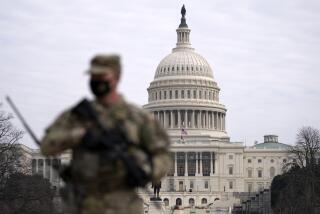Panel OKs Terrorism Insurance Bill
- Share via
WASHINGTON -- A tentative agreement on long-stalled legislation that would provide a federal safety net to the insurance industry for future terrorist attacks was reached Thursday between key congressional negotiators and the White House.
The agreement would usher in another major government program -- the second after an airline industry bailout -- that seeks to aid an industry from the economic fallout of last year’s attacks. Supporters of the measure say it is just as critical to the nation’s security as air marshals, new controls on the border and surveillance cameras at dams.
Under the bill, the government over the next three years would become the insurer of last resort for any damage caused by a terrorist attack exceeding $10 billion, up to $100 billion.
President Bush has repeatedly beseeched Congress to pass a terrorism insurance bill, casting the issue as an economic stimulus measure. The unavailability of terrorism insurance since Sept. 11, 2001 -- or the high cost of it -- has made it difficult for businesses to get financing for projects.
Bush has said that the bill would allow construction projects around the county to move ahead, providing 300,000 or more jobs.
“We believe we’ve got an agreement,” Sen. Christopher J. Dodd (D-Conn.), a lead Senate negotiator, said Thursday. “We’re on the brink of doing something very worthwhile in the closing hours of this Congress.”
White House spokeswoman Claire Buchan added that the administration is “very pleased that Congress is making progress toward reaching a final agreement” on a terrorism insurance bill.
All of the House-Senate negotiators still must formally approve the agreement, which would pave the way for passage from the full House and Senate. One of the negotiators still could snag the accord. But a top Republican involved in the talks, Rep. Michael G. Oxley of Ohio, said: “In any conference agreement, everyone must compromise, and that is what we have done here.”
It was unclear how soon the measure could be brought before the House and Senate for approval, but it may not be until after the November election.
The insurance industry expects to be able to pay the estimated $40 billion to $50 billion in claims stemming from last year’s terrorist attacks. But industry officials have said they cannot insure against the incalculable liability from future attacks without government assistance.
Businesses from builders and mortgage bankers to hotels and sports teams lobbied for the bill, contending that the unavailability or high cost of terrorism insurance has stalled more than $15 billion in projects.
After last year’s attacks, insurance companies stopped writing terrorist insurance or dramatically raised premiums, especially for tenants of high-profile landmarks such as sports arenas and skyscrapers. Of those who could get insurance, many faced caps on their coverage, high deductibles, exclusions for chemical and biological attacks or premium increases of as much as 200%, industry officials said.
Under the measure, insurance companies would be responsible for paying out a certain amount in claims -- a deductible -- before federal assistance becomes available. For losses above a company’s deductible, the federal government would cover 90%, while the company would contribute 10%.
The industry would be required to repay the government -- through a surcharge on policy holders -- up to $10 billion for the first year, $12.5 billion for the second and $15 billion for the third year of the program.
Losses would be capped at $100 billion.
Some consumer and taxpayer groups questioned whether the bill was needed.
“There is no crisis in the terrorism insurance business,” said Jill Lancelot, president of Taxpayers for Common Sense.
Frank Torres, legislative counsel for Consumers Union, added that the bill would force American consumers to underwrite the losses of the insurance, real estate, and construction industries.
“While those industries get a substantial financial benefit, they would not have to mitigate potential losses or address possible threats by taking appropriate precautions,” he said.
Dodd disagreed. “This is anything but a bailout,” he said. “All I hear from are policy holders -- people who can’t get [terrorism insurance] at any price ... Business cannot function if you cannot get insurance. If you cannot get insurance, banks don’t provide money. If banks don’t provide money, projects don’t move.”
The bill had been stalled for months because of a dispute mainly over one issue: whether individuals injured in a terrorist attack should be permitted to sue firms for punitive damages.
Republicans wanted to prohibit such suits, contending they would be tantamount to a second attack on a victim of terrorism. And Bush accused Democrats of doing the bidding of trial lawyers in opposing the ban.
Democrats countered that without the threat of punitive damages, businesses would not take precautions to protect workers.
In the end, the administration agreed to drop its demands for a ban.
“We’re disappointed that there are not additional protections on the liability front against abusive suits, but what is in the bill is good and an improvement over the process,” said the administration official.
Julie Rochman, a spokeswoman for the American Insurance Assn., said the organization has yet to see details of the measure.
More to Read
Get the L.A. Times Politics newsletter
Deeply reported insights into legislation, politics and policy from Sacramento, Washington and beyond. In your inbox twice per week.
You may occasionally receive promotional content from the Los Angeles Times.











